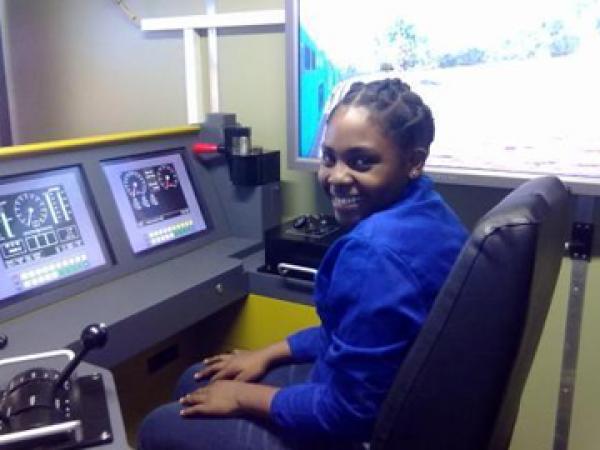

Vanessa Chinyanga might not shadow at Transnet again after three years of participation. Photo courtesy of Sandra Chinyanga.
5 March 2014
A Zimbabwean woman, Sandra Chinyanga, is unhappy because her daughter was dropped from the Techno Girl Programme after three years of consistent participation. Now she has been told that her daughter should never have been allowed to join the programme, because she is an immigrant.
According to the South African News Agency, the Techno Girl Programme is a partnership between the Department of Women, Children and People with Disabilities, Unicef, State Information Technology Agency (Sita) and Uweso Consulting.
Since its inception in 2007, the programme has reached over 10,000 girls, aged between 15 and 18, who were exposed to the work environment during school holidays through the programme.
Sandra told GroundUp that in 2012 her daughter, Vanessa, had been selected to participate in the Techno Girl programme. This programme helps to uplift girls from historically disadvantaged backgrounds who have an interest in science, technology and maths so that they can have careers in male-dominated fields like engineering.
When Vanessa was selected, Sandra was told her daughter would be in the programme until she finishes matric. If she passes her matric, the company that she is shadowing will help with a bursary for university. Chinyanga does general work for a medical doctor and cannot afford to send Vanessa to university without assistance.
Vanessa has a study permit and was already issued with a bank card, which she had been using all these years. She has been shadowing someone at Transnet for ten days every school holiday. Vanessa is now in grade 11. There are 19 other girls from her school in the programme who are shadowing different companies.
Chinyanga claims that in the 2012 June holiday, Uweso Consulting had tried to remove her daughter from the programme. Lolo Sibiya of Uweso then phoned to say Vanessa’s replacement had fallen ill and cancelled so Vanessa should attend the programme.
But on 13 February 2014, Sibiya informed Chinyanga that Vanessa would have to be totally taken out of the programme.
Chinyanga said she had told Staff Sithole, the CEO of Uweso Consulting, that Vanessa was being subjected to unnecessary discrimination, bullying in school and xenophobia because now the other kids in school would treat her as a foreigner. “They had also raised hopes for her that she has a future and now they are taking it away from her. I am hurt that I must tell my daughter the brighter future she has been looking forward to is taken away because she is a foreigner.”
She believes the programme was created to help girls from disadvantaged backgrounds. “By educating a foreign child not only are you are building a future for that child whose future is unknown, you are actually building Africa and strong women who will help in rebuilding their war-torn countries of origin. The CEO told me they cannot disclose if there have been immigrants in the programme before.”

Vanessa Chinyanga’s school. Photo courtesy of Vanessa.
When GroundUp contacted Sithole, she said that the school should have selected the girls according to the criteria, which stipulates that only South African children may be involved in the programme. She said that the programme aims to help historically disadvantaged South African girls from socio-economically deprived families. Thus it is focused on a particular group of girls and not all girls. She says that this means that not all girls both South African and non-South African automatically qualify to benefit from this programme.
Sithole said it is a programme aimed at addressing historical inequalities of the past in the country. Therefore, it excludes even South African girls who have been historically advantaged or who are currently advantaged, even if they are black.
Nadia Albino of Unicef said that they are investigating.